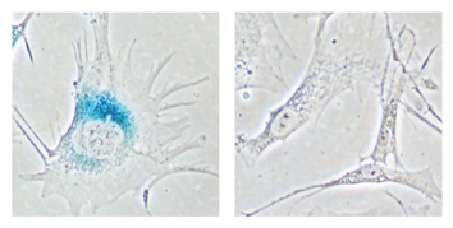Protein in metabolic reprogramming restrains senescent cells from becoming cancerous

In recent years, research has shown that cancerous cells have a different metabolism—essential chemical and nutritional changes needed for supporting the unlimited growth observed in cancer—than normal cells. Now, scientists at The Wistar Institute have identified a way that cells can reprogram their metabolism to overcome a tumor-suppressing mechanism known as senescence, solidifying the notion that altered metabolism is a hallmark of cancer progression.
The findings were published online by the journal Cell Reports.
Normal cells become senescent as an automatic way to halt growth in the presence of potential cancer-causing changes. In this study, researchers found that metabolic reprogramming allows for the proliferation of cells that should have become senescent, and these proliferative cells have the potential to lead to tumor formation.
"Senescence is an important suppressor of tumorigenesis," said Katherine Aird, Ph.D., a postdoctoral fellow in the laboratory of Rugang Zhang, Ph.D. and lead author of the study. "When the cell finds a way to get around senescence, like the mechanism we described, there is the potential for cells to become cancerous."
At the center of these findings is a protein kinase called ataxia telangiectasia mutated, or ATM. ATM is mutated in approximately 1 in 50,000 people, and these patients have a 25% lifetime incidence of cancer. In this study, researchers found that when ATM is suppressed, it both inhibits p53—which is highly involved in tumor suppressive metabolism—and increases the expression of the oncogene c-MYC, a gene known to play an important role in tumor-promoting metabolism. Essentially, the loss of ATM reprograms a cell's metabolism in such a way that it may promote cancer. This could explain why many cancers have lost ATM and provide possible additional insight into why people with ATM mutations have a higher than normal incidence of cancer.
"A better understanding of the basic regulatory processes that control cancer metabolism is critical for eventually targeting this process for the development of novel cancer therapeutics," said Rugang Zhang Ph.D., associate professor in Wistar's Gene Expression and Regulation Program and corresponding author of the study. "With this study, we have found that specific metabolic changes can overcome senescence. We may be able to exploit this for cancer therapy by reversing these senescence-overcoming metabolic changes."
"This is an extremely exciting and timely set of observations," said Dario C. Altieri, M.D., President and CEO of the Wistar Institute and director of The Wistar Institute Cancer Center. "The work that Katherine has just completed gives a completely novel perspective on how tumors can bypass a fundamental barrier that protects us against cancer. At the same time, the results point the way on how it may be possible to target the unique metabolism of tumor cells for novel therapies."


















